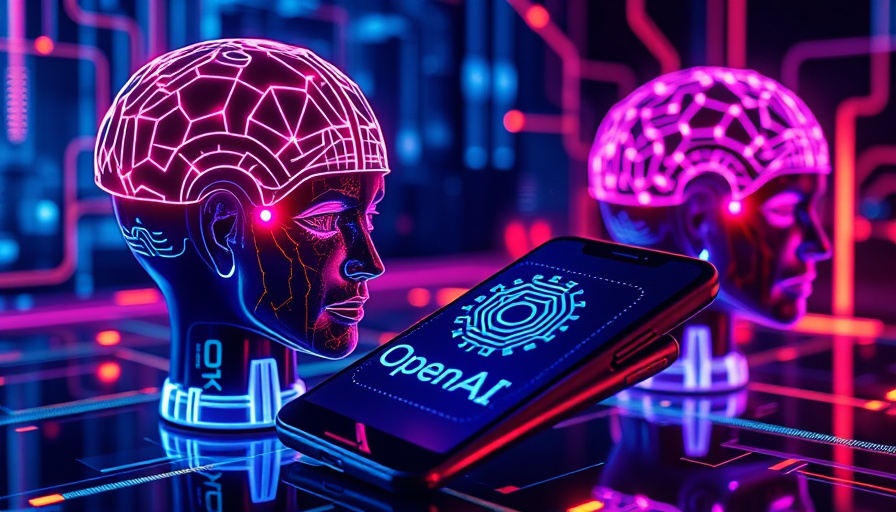
The Future of Creative Writing: AI Takes the Stage
OpenAI is venturing into uncharted territory with a new Large Language Model (LLM) that's reportedly adept at creative writing. Sam Altman, the company's CEO, has expressed a level of optimism not often seen in tech announcements, insisting that this AI is 'really good' at crafting narratives. However, initial examinations of the material produced by this model evoke mixed reactions, with some critics likening it to the prose of an inexperienced teenager navigating the labyrinth of creative expression.
AI Writing and Its Implications
In a social media post, Altman shared a lengthy excerpt from this new AI model, responding to a prompt that specifically instructed it to create a metafictional short story about AI and grief. While he noted it struck him profoundly, others interpret the output as revealing the fundamental flaws inherent in algorithmic creativity. This raises critical questions regarding the essence of artistic expression. How much of writing can truly be captured by a machine that lacks lived experience and emotions?
OpenAI's move towards enhancing AI's capabilities in creative writing is a significant shift from its usual focus on more structured tasks. The reported proficiency in tackling nuanced subjects like grief is noteworthy, but it also presents ethical dilemmas. As we embrace AI in creative domains, we must ponder what authenticity means. For many, writing steeped in personal history and human sentiment cannot be easily replicated by code. It is vital to assess whether the artistic value of a piece lies in its origin or the message it conveys.
The Challenge of Authenticity in AI-Generated Art
The recent work produced by OpenAI's new model has evoked comparisons to literary outputs that might be seen in high school creative writing exercises. Critics argue that while the AI can imitate style and structure, it lacks genuine depth—an essential ingredient in literature that resonates with readers. Grief, for instance, is a complex emotion best articulated through personal narratives, something an AI cannot genuinely replicate.
The narrative produced under the directive of 'write a metafictional literary short story' appears to reflect the limitations of AI in grasping intricate human emotions. Although the prose may exhibit correctness in punctuation and structure, the emotional weight feels absent. It addresses grief in a detached manner, offering interpretations that seem hollow and contrived. Such output raises a critical inquiry: when it comes to art, does proficiency in formal techniques equate to successful expression of human experience?
How Will This AI Influence the Future of Writing?
This recent development in AI writing tools sets the stage for discussions about the future role of human authors versus synthetic voices in literature. What could this mean for budding writers? OpenAI's ambition appears to signal a paradigm shift; the traditional gatekeepers of creative expression may face new competitors. Those invested in the realm of storytelling must reckon with the existence of AI as a collaborative partner or a threat to their craft.
As AI tools become increasingly sophisticated, will writers adapt and evolve in their practices, or will they find themselves overshadowed by machines capable of producing literate works at impressive speeds? Future narratives and considerations in educational paradigms surrounding writing could also morph, leading to integrations involving AI that enhance the pedagogical landscape. Writers might engage in a fusion of human creativity and machine learning, facilitating originality while exploring deeper emotional connections.
Cultural Reflections: The Humanities in an AI-Dominated World
Anxiety surrounding AI's influence on creative professions often stems from a fear of obsolescence, but perhaps it could also prompt a renaissance in our understanding of art and creativity. If machines can generate outputs that mimic human writing, what is left for the human artist? Might it catalyze a deeper appreciation for written craft by emphasizing the human stories underpinning the act of creation?
As society navigates the age of AI, pushing boundaries becomes paramount. Writers may innovate in their approaches to storytelling, drawing knowledge from AI capabilities while ensuring the emotion-laden authenticity of their works prevails. Embracing rather than resisting these changes may open the door for more diverse and rich narratives within our literary environments. The collision of AI and literature could usher in an era of collaborative exploration where both human and machine coexist as partners in creativity.
Engagement and Ethical Considerations
The ongoing development of AI writing tools presents a mixed bag of challenges and prospects. As enthusiasts embrace these advancements, meaningful discussions surrounding ethical considerations are crucial. While AI holds potential in solving writer's block or generating frames for creative exploration, the importance of human connection—shared experiences, cultural narratives, and emotional authenticity—should not fade into the background. AI should empower rather than replace the essence of human artistry.
In this evolving landscape, being a conscious consumer of AI-generated content becomes vital. Writers, readers, and technologists must articulate their expectations concerning AI's role in creative processes. Are we ready to accept AI's proclamations as part of our literary canon, or will we safeguard emotional nuances as intrinsic to storytelling? The decisions made in this regard will shape the artistic expressions of generations to come.
While creative writing may soon involve dialogues with intelligent algorithms, the heart of storytelling—grounded in human emotion and experience—must never be overshadowed. With these advancements, we urge you to engage critically with the material you encounter, fostering an appreciation for the rich tapestry of narrative that makes writing an enduring art form.
 Add Row
Add Row  Add
Add 




 Add Row
Add Row  Add
Add 

Write A Comment